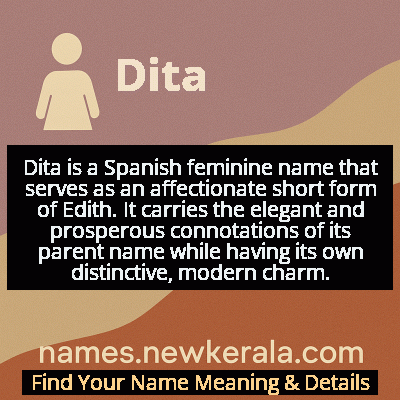Dita Name Meaning & Details
Origin, Popularity, Numerology Analysis & Name Meaning of Dita
Discover the origin, meaning, and cultural significance of the name DITA. Delve into its historical roots and explore the lasting impact it has had on communities and traditions.
Name
Dita
Gender
Female
Origin
Spanish
Lucky Number
7
Meaning of the Name - Dita
Dita is a Spanish feminine name that serves as an affectionate short form of Edith. It carries the elegant and prosperous connotations of its parent name while having its own distinctive, modern charm.
Dita - Complete Numerology Analysis
Your Numerology Number
Based on Pythagorean Numerology System
Ruling Planet
Neptune (Ketu)
Positive Nature
Intuitive, analytical, spiritual, and inquisitive.
Negative Traits
Secretive, reserved, aloof, and can be overly critical.
Lucky Colours
Green, yellow.
Lucky Days
Monday.
Lucky Stones
Cat’s eye, moonstone.
Harmony Numbers
1, 5, 6.
Best Suited Professions
Scientists, researchers, spiritual leaders, detectives.
What People Like About You
Depth of knowledge, analytical skills, spirituality.
Famous People Named Dita
Dita Von Teese
Burlesque dancer and model
Revived and modernized burlesque performance, becoming an international icon
Dita Parlo
Actress
Starred in classic films like 'L'Atalante' and 'Grand Illusion'
Dita Indah Sari
Labor activist
Prominent Indonesian labor rights activist and political prisoner
Dita Charanzová
Politician
Czech politician and Vice President of the European Parliament
Name Variations & International Equivalents
Click on blue names to explore their detailed meanings. Gray names with will be available soon.
Cultural & Historical Significance
The cultural significance of Dita extends beyond its linguistic origins to represent a bridge between traditional naming conventions and modern individuality. In many Spanish-speaking communities, the practice of using diminutives as formal names reflects cultural values of warmth, familiarity, and personal connection. Dita's international recognition through figures like Dita Von Teese has further enriched its cultural footprint, transforming it from a regional diminutive to a name with global artistic and fashion associations. This evolution demonstrates how names can transcend their original cultural contexts while retaining their essential character and charm.
Extended Personality Analysis
Individuals named Dita are often perceived as creative, confident, and charismatic. The name carries an artistic flair, suggesting someone with strong self-expression and a distinctive personal style. Ditas tend to be independent thinkers who aren't afraid to stand out from the crowd, often possessing a magnetic personality that draws others to them. They typically exhibit a blend of traditional values inherited from the name's formal origins with a modern, unconventional approach to life. This combination creates individuals who are both grounded and innovative, capable of honoring tradition while pushing boundaries.
Their creative energy is often balanced with practical intelligence, making them effective at turning imaginative ideas into tangible achievements. The name suggests someone who values authenticity and isn't afraid to challenge conventions when necessary. Ditas are often seen as trendsetters rather than followers, possessing an innate sense of style and aesthetic appreciation. They tend to be resilient individuals who can adapt to changing circumstances while maintaining their core identity. The name implies a person who combines emotional depth with outward elegance, creating a compelling presence that leaves a lasting impression on others. This blend of characteristics makes Ditas often successful in creative fields, leadership roles, or any arena that values both innovation and substance.
Modern Usage & Popularity
In contemporary times, Dita maintains moderate popularity in Spanish-speaking countries while gaining international recognition through prominent figures like Dita Von Teese. The name strikes a balance between being distinctive without being overly unusual, appealing to parents seeking a name that's both traditional and modern. Its usage has expanded beyond Spanish-speaking communities due to globalization and celebrity influence, though it remains most common in Latin American and European contexts. Recent naming trends show increased interest in shorter, punchy names with international appeal, which has helped maintain Dita's relevance. The name continues to be chosen for its elegant simplicity and cross-cultural accessibility, particularly among parents who appreciate names with artistic connotations and global recognition.
Symbolic & Spiritual Meanings
Symbolically, Dita represents the transformation of tradition into contemporary expression. As a diminutive that gained independent status, it embodies the idea of evolution and adaptation while maintaining connection to roots. The name carries connotations of artistic freedom, individuality, and the courage to redefine established norms. It symbolizes the balance between heritage and innovation, suggesting someone who honors their origins while forging their own path. In metaphorical terms, Dita represents the beautiful paradox of being both grounded and free, traditional and revolutionary, intimate and powerful. The name's journey from nickname to standalone name mirrors the human capacity for growth and self-definition, making it a powerful symbol of personal evolution and the creative reinterpretation of tradition.

